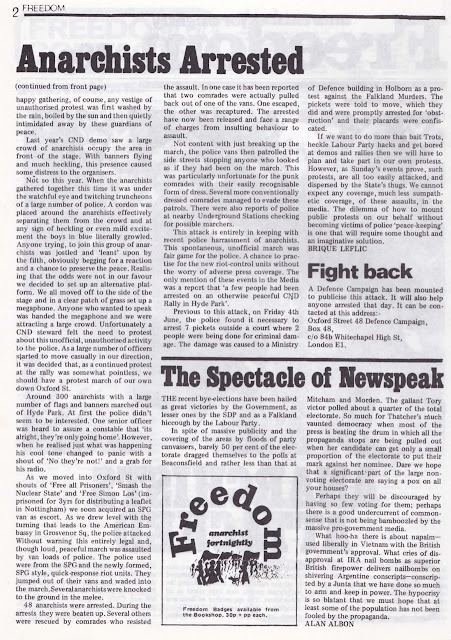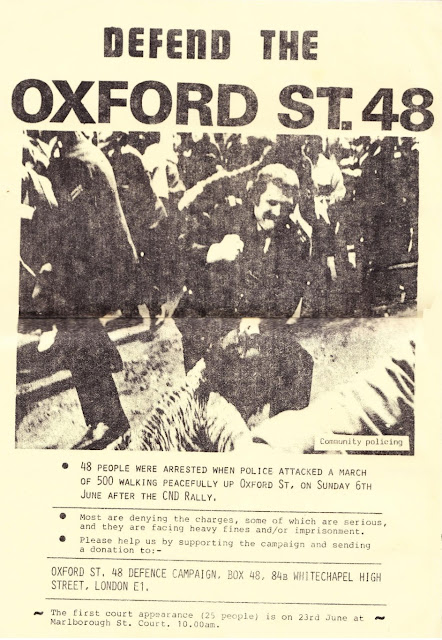Monday, August 26, 2024
Friday, August 23, 2024
Judy Chicago at Serpentine
Judy Chicago 'Revelations' is a retrospective of the artist's work at London's Serpentine gallery. Her feminist imagery is quite familiar to me, such as 'Rainbow Warrior (for Greenpeace)' which depicts a Goddess figure seemingly protecting the creatures of the sea. It was painted in 1980, five years before Greenpeace's Rainbow Warrior ship was blown up by the French state while protesting against a nuclear test.
Wednesday, August 21, 2024
Tower Hamlets - Cockney Rebels exhibition
 |
| African music in East London A Ghana Independence Day Celebration at the St Louis Club, 46 Commercial Road E1 in 1958 with 'African Cubano Band Leader Jimmy Scott'. Plus at the Cosmopolitan Club (1963?), 9 Artillery Passage, Bishopsgate E1, Deroy Taylor 'West Africa's Leading Guitarist' in a night 'featuring Ghana High Life, Jazz, Cha-Cha and Twist'. Ghanaian music legend Deroy Taylor aka Ebo Taylor had a an international hit in 2010 with 'Love and Death'. |
 |
| 'The twilight jazz at Poplar. Open air dancing at the public recreation ground last night. It will be seen that male partners were shy' (The Star, 17 June 1919) |
.JPEG) |
| Wobble, Singh and Smith |
Friday, August 02, 2024
Unite Against Racism demo in East End 1994 + a spycop report on David Bowie donating to Anti Nazi League
In 1993 the far right British National Party achieved a breakthrough in the East End of London when one of its members was elected as a councillor on the Isle of Dogs in Tower Hamlets. This was a period of racist murders, including the killing of Stephen Lawrence not far from the BNP HQ in Welling, SE London. The BNP still had a street presence in East London too, selling papers on Brick Lane.
It was also a period of mass opposition to the far right, one of the largest manifestations of this being the 'Unite Against Racism' demonstration called by the Trades Union Congress (TUC) on 19 March 1994. Around 50,000 people took part in the march through the East End, from Spitalfields to London Fields. This was part of a wider mobilisation that among other things led to the BNP losing their council seat in new elections in 1994.
Saturday, July 27, 2024
Art Not Evidence: against the criminalisation of rap and drill
 |
| Art Not Evidence posters in Camberwell, South London, July 2024 |
'Art Not Evidence is a growing coalition of lawyers, journalists, artists, academics, youth workers, music industry professionals and human rights campaigners working together to fight the criminalisation of rap music in UK courts'. Here's their statement:
'In recent years, courtrooms across the country have gained an alarming new soundtrack. Prosecutors — with increasing frequency — put lyrics, music videos, and audio recordings in front of juries to help secure criminal convictions. In many cases, these creative expressions have no connection to the serious crimes alleged, and are used to paint a misleading and prejudicial picture, conflating art with evidence.
Specifically, police and prosecutors use the act of writing, performing, or even engaging with rap music to suggest motive, intention, or propensity for criminal behaviour. This is particularly prevalent in controversial "joint enterprise" and conspiracy cases, in which music, lyrics, and videos are used to drag multiple people into criminal charges, often under sweeping definitions of “gang” activity. This practice disproportionately affects young Black men and boys from under-resourced, marginalised communities. It is an agent of institutional racism.
Rap music, including the drill sub-genre, is one of the most popular forms of music across the country, and a significant cultural force, producing Glastonbury and Wireless headliners, multiple industry award winners, and enjoying an artistic influence that extends into film, literature, television, and the visual arts.
Yet, despite being known for its storytelling, symbolism, figurative language, and hyperbole, police and prosecutors invite judge and jury to take rap music literally, as direct evidence of criminal intent or behaviour.
Research produced by journalists and university academics have identified over 100 cases in the UK since 2005 in which rap music was used as evidence. The majority of these cases involved multiple defendants, making use of the doctrine of joint enterprise. In the last three years alone, at least 240 people have had their fate in court decided, at least in part, by their taste in music.
This is an urgent issue, and one which demands an urgent response.
The indiscriminate use of creative expression as evidence in court risks miscarriages of justice, perpetuates harmful racist stereotypes, and contributes to a racially discriminatory criminal justice system that stifles creativity and freedom of expression. We applaud law reform campaigns in the USA, including the enactment of legislation in California, and urge judges, lawyers and legislators in the UK to follow suit.
We call for police and prosecutors to stop relying on irrelevant, unreliable, and highly prejudicial evidence in pursuit of convictions; for defence lawyers to challenge prosecutors; and for judges to exclude such evidence.
We propose legal reform to limit the admissibility of creative expression as evidence in the criminal courts.
We seek justice, and your support, in our mission to achieve it'.
Saturday, July 20, 2024
Beat the Blues Festival 1980: 'Post punk Woodstock' at the Ally Pally
 |
| A ticket for the day signed by John Cooper Clarke (from ivaninblack) |
 |
| Advert from Socialist Challenge, 5 June 1980 - 'Beat the Tory Blues' |
 |
| The Pop Group |
 |
| The Slits |
Saturday, July 06, 2024
The Oxford Street 48: arrests on peace march (1982)
On Sunday June 6th 1982, the Campaign for Nuclear Disarmament held a huge demonstration to coincide with a visit by US President Ronald Reagan. Up tp 250,000 people marched to London's Hyde Park, where the speakers included Labour MP Tony Benn and miners' leader Arthur Scargill. The recent Falklands war had shown up the weakness of the peace movement, which had failed to significantly mobilise against the war. This account of the demonstration was written in a text '1980 to 1984: anarchy on the CND demo':
"At Hyde Park it was the same as usual and anarchists who tried to heckle the speakers were kept miles away from the front of the stage by police. Some of us gathered behind the official platform setting up our free platform with a megaphone to discuss the Reagan visit, the Falklands war and any issue the people wished to raise. Many took advantage of this situation to air their views, as the official platfor was only open to invited speakers, not to anyone who might have something creative or new to suggest. A proposal was made that we move out of Hyde Park where we were wasting our time and take the issues to the London crowds in Oxford Street. This idea was greeted with enthusiasm. About 300 people gathered at the Speakers Corner end of Hyde Park and by now many of us were in defiant mood. Some began breaking across the road over to Oxford Street, there were no stewards this time. There was a lot of confusion with people trying to keep the group together and deciding what to do next. The group pushed on loudly down Oxford Street with more following behind. Fump! Hooray! Everyone cheered as someone let off fireworks and the traffic was blocked. It was some time before the vans started to arrive on the scene. As the police vans slowly pulled up in force those in the front decided to head down a side street to the american embassy it was too late, the police jumped from the vans and charged into the march. About 20 marchers made it into the side street and were able to escape including one who received a nasty gash on the forehead form a truncheon. However 48 were arrested".
An Oxford Street 48 Defence Campaign was set up to support those arrested, and Scottish punk band Political Asylum recorded a track 'Oxford Street 48':
The events were reported in 'Freedom' as 'Anarchists Attacked':
'Around 300 anarchists with a number of flags and banners marched out of Hyde Park. At first the police didn't seem to be interested. One senior officer was heard to assure a constable that 'its alright, they're only going home'. However, when he realised just what was happening his cool tone changed to panic with a shout of 'NO they're not!' and a grab for his radio.
As we moved into Oxford St with shouts of 'Free all Prisoners', 'Smash the Nuclear State' and 'Free Simon Los' (imprisoned for 3yrs for distributing a leaflet in Nottingham) we soon acquired an SPG van as escort. As we drew level with the turning that leads to the American Embassy in Grosvenor Sq, the police attacked Without warning this entirely legal and, though loud, peaceful march was assaulted by van loads of police. The police used were from the SPG and the newly formed, SPG style, quick-response riot units. They jumped out of their vans and waded into the march.
Several anarchists were knocked to the ground in the melee. 48 anarchists were arrested. During the arrests they were beaten up. Several others were rescued by comrades who resisted the assault. In one case it has been reported that two comrades were actually pulled back out of one of the vans. One escaped, the other was recaptured. The arrested have now been released and face a range of charges from insulting behaviour to assault.
Not content with just breaking up the march, the police vans then patrolled the side streets stopping anyone who looked as if they had been on the march. This was particularly unfortunate for the punk comrades with their easily recognisable form of dress. Several more conventionally dressed comrades managed to evade these patrols. There were also reports of police at nearby Underground Stations checking for possible marchers'.
 |
| (Freedom, 12 June 1982 - the address for the campaign at 84b Whitechapel High St was/is the Freedom bookshop) |
 |
| '48 people were arrested when police attacked a march of 500 walking peacefully up Oxford Street on Sunday 6th June after the CND rally. Most are denying the charges, some of which are serious'. (leaflet reproduced in Toxic Graffiti zine at the time)  (Militant, 11 June 1982)   (Socialist Worker, 12 June 1982 -wonder whether Morrissey got the title for The Smiths 'Barbarism begins at home' from this article? Though I have read that the demo title for that song was 'Fascism beings home' See also: Reagan visits London 1984 |
Friday, June 28, 2024
Working Class Records: Antifascista Siempre
Monday, June 17, 2024
Wild Combination: Arthur Russell zine
Monday, May 20, 2024
Stay True
'first, I was drawn to raves more for the idea of community than the music itself. You found a flyer, called a number, copied down the directions. It meant surrendering to a void, a cluster of headlights the signal you were in the right place. I never did drugs, but it still felt magical to be in a room with no center, where the only way of orienting yourself was by following a bass line or synth wash. This was a range of faces you didn't see in daytime: vacant and somber, devoted to the rhythm; smiling and platonic, eager to share; rapturously free. Something was always already happening. People walked in casually, and their gait slowly adapted to the sounds around them, and within minutes they looked as though they were trying to punch and kick their way out of an imaginary sack. It didn't matter how you danced'
Hua Hsu, Stay True: a memoir (2023) - writing about Berkeley, Calfornia in the mid/late 1990s
Saturday, May 11, 2024
My student occupations - University of Kent at Canterbury (1981-84)
 |
| A picket during the 1981/82 rent strike |
 |
| Incant, March 1983 |






.jpg)











.JPEG)















